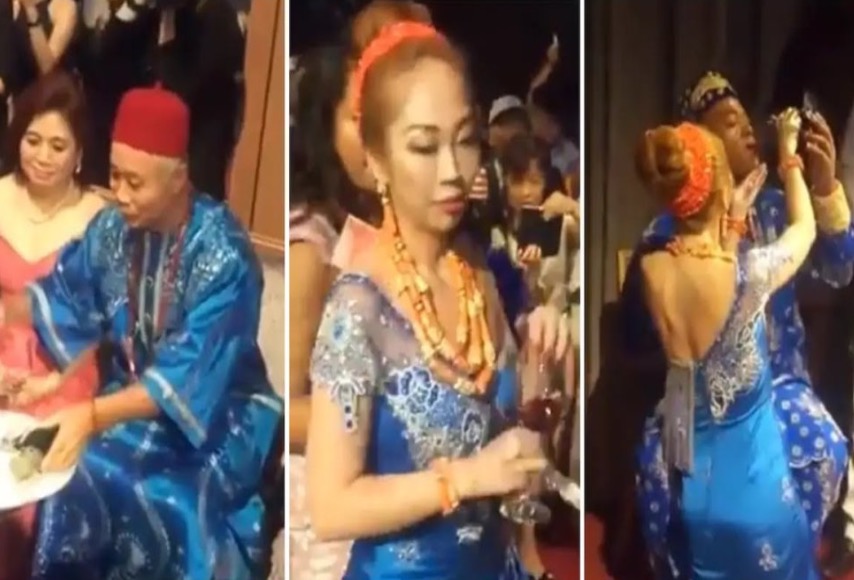Eman Okonkwo’s foot-tapping at the altar is not a sign of nerves. The groom’s palms aren’t sweaty, there are no pre-wedding jitters and certainly no second thoughts. Today he is realising a dream imagined by countless African merchants in Guangzhou: he is marrying a Chinese bride.
Seven days earlier, Jennifer Tsang’s family was oblivious to their daughter’s romance. Like many local women dating African men, the curvaceous trader from Foshan, who is in her late 20s – that dreaded “leftover woman” age – had feared her parents would be racially prejudiced.
Today, though – having tentatively given their blessing – they snuck into the underground Royal Victory Church, in Guangzhou, looking over their shoulders for police as they entered the downtown tower block. Non-state-sanctioned religious events like this are illegal on the mainland.
“Today is so special,” beams the Nigerian, “because I have married a Chinese girl. And that makes me half-African, half-Chinese.”
In Guangzhou, weddings like this take place every day. There are no official figures on Afro-Chinese marriages but visit any trading warehouse in the city and you will see scores of mixed-race couples running wholesale shops, their coffee-coloured, hair-braided children racing through the corridors.
While Okonkwo’s dream of becoming Chinese through matrimony is futile – the Guangzhou Public Security Bureau (PSB) denies African husbands any more rights than a tourist – his children, should he have any and they be registered under Tsang’s name, will possess a hukou residency permit and full Chinese citizenship.
The relationship with Africa that China has so aggressively courted for economic gain – 2012 saw a record US$198 billion of trade between the pair – is producing an unexpected return: the mainland’s first mixed-race generation with blood from a distant continent and the right to be Chinese.
“CHOCOLATE CITY” OR “Little Africa”, as it has been dubbed by the Chinese press, is a district of Guangzhou that is home to between 20,000 and 200,000, mostly male, African migrants (calculations vary wildly due to the itinerant nature of many traders and the thousands who overstay their visas).
Africans began pouring into China after the collapse of the Asian Tigers in 1997 prompted them to abandon outposts in Thailand and Indonesia. By exporting cheap Chinese goods back home, traders made a killing, and word spread fast. Guangzhou became a promised land.
It is easy to believe that every African nation is represented here, with the Nigerian, Malian and Guinean communities the most populous. But Little Africa is a misnomer; in the bustling 7km stretch from Sanyuanli to Baiyun, in northern Guangzhou, myriad ethnicities co-exist.
Uygurs serve freshly baked Xinjiang bread to Angolan women balancing shopping on their heads while Somalis in flowing Muslim robes haggle over mobile phones before exchanging currency with Malians in leather jackets, who buy lunch from Turks sizzling tilapia on street grills, and then order beer from the Korean waitress in the Africa Bar. Tucked away above a shop-lined trading corridor, the bar serves food that reminds Africans of home – egusi soup, jollof rice, fried chicken.
Whereas Chungking Mansions conceals Hong Kong’s low-end trading community, in dilapidated Dengfeng village – Little Africa’s central thoroughfare – the merchants, supplied by Chinese wholesalers, are highly visible. And it’s in this melee of trade where most Afro-Chinese romances blossom.
Amadou Issa came to China in 2004. We meet in Lounge Coffee, a hangout popular with African men who like a cigarette with their croissant, while a Celine Dion CD plays in the background. Through the nicotine haze, the 34-year-old from Niger – rated by the United Nations as one of the world’s least developed nations – tells me he arrived at Baiyun International Airport with US$300, simply wanting “to survive”.
Today, he owns a five million yuan (HK$6.3 million) flat in Zhujiang New Town, Guangzhou’s smartest district, drives a car worth US$64,000 and speaks Putonghua. Issa ships 50 to 200 containers home per year – full of construction materials, because “they’re the most lucrative” – and makes an average US$2,000 on each container.
A friend, Yusuf Sampto – a trader with three shops in West Africa’s Burkina Faso – pulls up a chair. They excitably describe stuffing suitcases with “literally millions” of US dollars to move their profits back to China once the goods have sold (they declare the cash at customs, they say). African banks can’t be trusted, they explain, and it’s impossible for a migrant to open a current account in the mainland.
Like most of Guangzhou’s successful traders, Issa has a Chinese wife.
“She used to work for a company I ordered from, and we became friends,” he says. “We had a Chinese wedding and a Muslim wedding. Her name was Xie Miemie but I renamed her Zena.”
Zena is from Hainan Island and Issa was the first African man her family had ever seen.
“Initially, they were unsure about me, but now, when I’m not there, they ask my wife, ‘Where is your import husband?'” Issa chuckles.
Youssou Ousagna also gets along well with his in-laws. The retired footballer moved from Senegal to Sichuan province in 2005, having been scouted by Chengdu Tiancheng FC. In 2007, after an injury had ended his playing career, Ousagna moved to Guangzhou, where he met his Hangzhou-born wife – she worked at the pharmacy from which he picked up medicine for ongoing football injuries.
Her parents are both doctors, her sister is a surgeon and her brother a policeman in Guangzhou. This middle-class family have welcomed their Muslim son-in-law.
“With most Chinese, communication is the problem,” Ousagna says. “I speak Mandarin, so we understood each other. No problem.”
Outside Little Africa, however, racism remains deep-seated, says Gordon Mathews, a professor of anthropology at the Chinese University of Hong Kong who is researching low-end globalisation in Guangzhou.
“I know three or four relationships where the couple had expected it to lead to marriage, but as soon as the Chinese family met the African boyfriend, they had to end it,” he says. “Marrying a black person is still marrying down in China.”
Racial prejudice on the mainland hit the headlines in 2009, when Lou Jing, an Afro-Chinese singer, then 20, appeared on an American Idol imitation television show, sparking controversy and drawing racial slurs online. “How can a mixed-race contestant become a Chinese idol?” bloggers demanded.
Chinese prejudice against Africans is normally based on three aspects: traditional aesthetic values, an ignorance of African culture and society, and the language barrier.
Furthermore, until the 1970s, foreigners were not permitted to live in the mainland, let alone marry a Chinese. When a child is born, the parents must register its ethnicity with the authorities: of the 56 boxes they can tick, “mixed-race” is not an option.
But there are factors other than racism that might lead a family to reject a mixed marriage.
Linessa Lin Dan, a PhD student at the Chinese University of Hong Kong researching Afro-Chinese relations in Guangzhou, says many African men who propose already have wives in their home countries – Muslims are permitted by their religion to take multiple spouses. Furthermore, Lin has heard tales of husbands returning to Nigeria on a business trip, leaving a mobile-phone number that doesn’t connect and disappearing.
“The Chinese wife is left with their children, and shamed for marrying a hei gui [black ghost],” says Lin.
Generally, though, the African bachelors in Guangzhou are not desperate asylum seekers: they are highly eligible businessmen. Like Ousagna and Issa, they often own a car, have a stable income and speak Putonghua. Forty per cent of African migrants surveyed in Guangzhou for the book Africans in China (2012), by former University of Hong Kong professor Adams Bodomo, had received tertiary education – some even held a PhD.
As one Congolese merchant tells Post Magazine, “To start a business in China you have to be quite well-to-do. In the early days, the air ticket alone cost US$2,000.”
Despite their eligibility, most African grooms in Guangzhou marry Chinese economic migrants whose disapproving families reside far from the city. In business terms, it is the ideal merger, says Lin, who believes most Afro-Chinese marriages are a cynical play for better business.
“Opening a shop is very difficult for foreigners,” she says. “You need a Chinese passport or the landlord will ask for a bribe. A Chinese wife can speak to suppliers. It’s useful to have a Chinese partner.
“Many Chinese women want to marry Africans because they are from poor rural areas, often Hunan or Hubei provinces. Marrying a foreigner is a way to upgrade their social status, because the Africans have money.”
Instead of taking a factory job, a Chinese woman who marries an African man often becomes head of his wholesale shop, should he open one, and a key player in his export business.
Pat Chukwuonye Chike – a garment trader by day and Nigerian hip-hop artist known as Dibaocha Sky by night – has a Chinese wife who doubles as a business partner. But, he says, if African men could legally work in China, many might not take a local wife.
“That is my sacrifice,” says the married father-of-two. “My wife cannot cook. My mother-in-law helps look after the children, and she is poisoning them against Africa. She’s an old woman, she knows the game she’s playing. There is crisis everywhere – terrorists were in Guangzhou last week – it is a sin to make my children scared of Nigeria.”
Africans in Guangzhou fall into two groups: those with valid documentation and those whose visas have expired. For those who have overstayed, a Chinese wife is more than a business partner; she is key to survival.
Last August, a major police bust on an African-led drug ring turned life into a daily fight against deportation for overstayers. From dusk till dawn, police checked passports in Guangyuan Xi Lu, the Nigerian annex of Little Africa, where most of the city’s overstayers can be found.
“When Nigerians land at Baiyun Airport many throw away their passports,” Lin says. “They only get seven- to 30-day visas [less than most other Africans] – it’s not enough time to make their fortunes.”
Overstayers face a 12,000 yuan fine and must pay for their 6,000-yuan air ticket out of the country. Those with Chinese wives went underground while their spouses manned their businesses.
“During this period, Nigerians with Chinese wives survived better,” says Lin.
While the crackdown proved a Chinese wife’s worth, the loyalty displayed points to genuine devotion in Afro-Chinese romances.
Pastor I.G., of the Royal Victory Church, has a Chinese wife, and children. One Sunday I ask him, “Is it love or business?”
The Nigerian sighs. He feels “slighted” by repeated assumptions his eight-year marriage is economically motivated. He met Winnie, a native of Guangdong province, at church and the pair are united in their evangelic mission (“God knows it’s China’s time,” he says). Winnie, 34, is a pastor at the church’s 100-worshipper-strong Chinese arm while he leads the larger African congregation. Their tactile body language speaks volumes about their union.
Michelle Zhang Nan, 35, doesn’t fit the profile of a trader’s wife, either. When we meet at McDonald’s, she is dressed in an expensive A-line dress and kitten heels. Her three-year-old son, Calvin, trails behind as she carries a tray of Big Macs and milkshakes.
A university graduate whose parents are government officials, Zhang lives in Guangzhou but has a prized Beijing hukou and owns a phone-battery retail business.
“I liked the way he did business,” she says, of falling in love with her South African husband. “If I was married to a Chinese man, I could not be a strong woman like I am today. My husband is 11 years older and he teaches me.”
She notes that a Chinese man would benefit equally from taking an African wife, but that is unheard of in Guangzhou. As one bootylicious Liberian hairdresser, who works on the third floor of a tower block, says, “Chinese men aren’t manly, they aren’t sexual to us.” (East African prostitutes working in Little Africa, however, report that 50 per cent of their clients are Chinese men who “want to try it”, according to Matthews.)
But a Chinese wife cannot solve an African migrant’s biggest problem: his visa. Happy families can be swiftly torn apart if the PSB denies a continuation on an African husband’s temporary documents. The central government pointedly lacks an immigration department, meaning there is no framework for the assimilation of newlyweds such as Okonkwo.
Policy differs from province to province and, compared with those in other Chinese cities, the Guangdong authorities are notorious for their hostile and inconsistent attitude to African migrants.
Throughout the two months I conducted interviews, African husbands reported getting a variety of visas. Nigerian businessman Tony Ekkai – who has two Afro-Chinese children – has a “representative office” of his Hong Kong-registered business in Guangzhou, and therefore is entitled to a coveted one-year, multiple-entry business visa. His Nigerian friend Tony Michael, also married to a Chinese woman, with a two-month-old son, is despondently stuck on three-month visas. Six-month, single-entry visas are all Zhang’s husband has seen.
Many, like Ousagna, return to their wives’ provinces to renew their visas, to evade the capricious Guangzhou authorities. Others – such as Guinean trader Cellou, who has a one-year residence pass – say their country’s good political relationship with Beijing helps their visa applications. Guinea was the first sub-Saharan country to forge diplomatic ties with China, and Cellou, who studied business at the International Islamic University Malaysia, spots the glaring double standard: “If my [Chinese] wife stays in Guinea she can get a Guinea passport.”
African states – home to millions of Chinese, also often undocumented – are watching closely to see how their citizens are treated on mainland soil. After a 2012 crackdown in Beijing on African migrants, Nigerian immigration authorities immediately retaliated, arresting 45 Chinese traders in the northern city of Kano.
With so much at stake for Sino-African relations, Beijing is playing a cautious game.
Lan Shanshan, a research assistant professor at Baptist University, claims there is a media edict on the mainland to report favourably on Africans in China, hence the state-owned newspaper Guangming Daily’s three-part special titled “Friends From Africa, How are You Doing in Guangzhou?”, in 2012.
But a WikiLeaks cable from 2008 revealed that the central government is troubled by the phenomenon, and quietly funded covert research into Africans in Guangzhou, specifically their impact on crime, underground religion and missed tax revenue. The American diplomat who wrote the cable to Washington was not privy to the findings.
In 2011, the government dropped its poker face with the ground-breaking Guangdong Act, which offered rewards to Chinese who snitched on overstayers; made it illegal for employers, hoteliers or educational institutes to serve illegal migrants, and insisted they report all cases to the PSB or face a 10,000 yuan fine; and expanded police powers so that any officer, not just members of the foreign affairs department, could stop foreigners to verify passports.
Even those with valid visas were rattled. A Ugandan told Lan, “A visa is not a 100 per cent guarantee here. When police stop you, if you do not look like a pleasant person to them, they may draw the line on your visa and cancel it. They say, ‘China gives, China takes.'”
IN 2010, BODOMO PREDICTED that in 100 years’ time “an African-Chinese ethnic minority group could be demanding self-identity and full citizenship rights in the heart of Guangzhou”.
But that’s already happening.
Ojukwu Emmanuel, 42, is the man spearheading this campaign. A political heavyweight in Guangzhou, he is the elected head of the Nigerian community (each African nation has an informal community representative) and also goes by the ostentatious title of President of Africa in China.
Emmanuel came to Guangzhou in 1997. He has a Chinese wife, a four-year-old son and, in 2012, he formed the Nigerian-Chinese Family Forum, comprised of 200 mixed-race couples and their offspring. His team put together a dossier outlining the contributions to society made by Nigerians and presented it to the PSB, demanding longer and more lenient visas for those with families.
“A lot of people are having children now and we need to know their future,” he says.
Emmy Marc-Anthony, Emmanuel’s assistant and a former TV actor in Nigeria, says, “We are contributing to the economy, we are bringing money from our home countries and investing here, spending money, and give great jobs to local Chinese.”
The PSB listened to the appeal; perhaps it was fearful of unrest. In 2009, 200 Africans rioted after a Nigerian jumped to his death from a building to escape a passport check. That was the first time in many decades that foreigners had protested en masse in the mainland.
Marc-Anthony now has a three-year resident visa.
“Very soon I hope they will give us ID cards,” he says.
But for those not associated with the Nigerian-Chinese Family Forum – which is the vast majority of Africans in Guangzhou – things aren’t getting easier. Last year, the central government passed the draconian Exit-Entry Administration Law.
Africans who were hoping this highly anticipated law would open up China in terms of immigration and give husbands access to permanent resident status were sorely disappointed.
“In reality, rather than changing the rules of the game, the law marked a nationwide change in attitude,” says Robert Castillo, a PhD student in cultural studies at Lingnan University. “The Ministry of Public Security, it seems, is serious about controlling the presence of foreigners in the country.”
Before, Africans could renew their visas by crossing the border into Hong Kong or Macau; now they must return to their home nations to reapply.
“With such instability, Africans are forced to be living and renting in China but having savings and investments – i.e. housing – in Africa,” says Castillo. “The future of families with one foreign parent is precarious.”
Pastor Daniel Michael-Mbawike, who founded the Royal Victory Church after leaving Nigeria in 1994, was banned from the mainland for proselytising to the Chinese. Now heading the church from Hong Kong, he has seen families torn apart by the new law.
“The authorities are refusing or cancelling visas for no reason,” he says, “Brother Abu’s visa was suddenly cancelled. He has a wife and two kids but had to go back to Nigeria. Another two girls got engaged to Africans but the men are stuck in Nigeria and trying to get back for their wedding.”
Given such inhospitable conditions, 95 per cent of the Africans I interview say they want to leave, though no one has a time frame for their departure.
To add insult to injury, while Africans are denied Chinese citizenship, they are still subject to the one-child policy.
I.G. and Winnie have three children, Peace, aged eight, Joshua, six, and 1½-year-old Jeremia.
“After the second child they asked us to pay 30,000 yuan even though I’m a foreigner,” he says, with a what-can-you-do shrug.
At the time, the couple fought bitterly over whether or not to oblige.
The two eldest children are registered under their mother’s name and so have Chinese passports and hukou; Jeremia is tagged onto his father’s one-year visa. Unless the family can find another 30,000 yuan or the situation changes, he will not be able to freely attend local schools, will have less access to medical services and, come his 18th birthday, will enter the same visa quagmire his father has waded through for years.
But I.G. looks on the bright side.
“Maybe one day he will become a Chinese Obama,” he laughs.
Zhang also dreams big for Calvin.
“After middle school he will go to Beijing, where my hukou is, because it will be better for his college application,” she says. “I hope he studies hard and gets a very good job in Beijing.”
As Calvin rampages through McDonald’s, pulling trays off tables and trying to urinate into a plant pot, I hope he can live up to his mother’s expectations.
AT THE HUILING Integrated Kindergarten in Baiyun, Amina Magasaga arrives for lessons. The five-year-old, who has a Chinese mother and Malian father, loves Hello Kitty, speaks perfect Putonghua and is fluent in English.
Amina is not unusual at Huiling: her class of 30 includes Uygur Muslims, Chinese, children of African migrants and two other Afro-Chinese students.
Her teacher, Miss Ariel, herself a migrant from Harbin, says there have never been any Lou Jing-esque racist incidents at the kindergarten; these children have a new, multi-ethnic concept of being Chinese. But while integration at kindergarten level seems successful, the challenges facing Amina’s parents means this little girl’s future may not be in China.
As labour costs in China rise – making goods more expensive to export – and hostility to foreigners intensifies, dinnertime debates over whether to relocate to Africa are on the rise. It’s a decision that many couples have already taken. Ariel reports that in 2009, there were 27 African children in the kindergarten – more than a third of the total student population. Today that proportion has shrunk to about a sixth.
“Sadly, I’ve heard African men saying if the economy slows down, and business goes bad, they will have to leave, even if their families do not follow them,” says Castillo. “People without [options in China] are worried about the prospects of being forced to abandon their families.”
Undeniably, most African fathers, once they become rich, want to return home. But intractable problems in their birth nations – the terror wrought by Boko Haram in Nigeria, al-Shabab in Kenya, recurring droughts in Burkina Faso – mean that, for many, Africa will still have to wait. What their wives do when that time comes is another matter.
Guangzhou’s Afro-Chinese children – a living legacy of an economic dream – are still maturing: few are more than 10 years old. But when Amina’s generation reaches adulthood, they, too, will have to decide, just like their fathers before them, where their land of opportunity lies.
By SCMP





